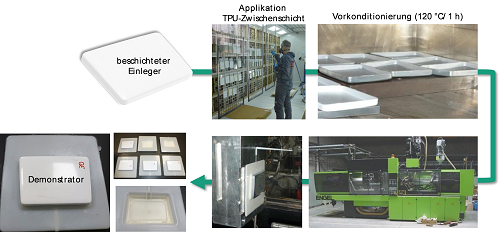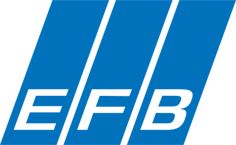Project Summary
Within the framework of the European collective research project the project consortium consisting of the Fraunhofer Institute of Machine Tools and Forming Technology IWU together with the Leibniz Institute of Polymer Research Dresden (IPF) and the Belgian Centre for Research in Metallurgy (CRM) and The Collective Centre for the Belgian Technology Industry Sirris deals with the development of relevant technologies and process routes for the efficient manufacturing of ready to use hybrid parts.

The innovative approach of the project is the connection between the metal and the plastic that shall consist of adhesive bond in the form of a 2-in-1 (adhesion promoter + surface finishing) powder-coating system. In the novel functional powder coating formulation a latent adhesive function is integrated which can be used for chemical bonding in subsequent efficient industrial processes (e.g. injection moulding) in order to create structural parts. Thus, additional thermoplastic materials can be connected to the pre-coated metal resulting in multi-material parts with high-bond-strength in a cost-efficient way. Product costs can be lowered by a quarter of current final product costs by introducing this high-performance, 2-in-1 coating system to the market saving several pre-treatment steps and additional glue application.
On that basis several powder coating systems were produced by the Leibniz Institute of Polymer Research Dresden using the new crosslinking mechanism. The aim of the coating development was to achieve a maximum bonding strength with retention of the forming stability at the same time. In parallel the Belgian Centre for Research in Metallurgy developed a large-scale method which makes it possible to pre-treat the aluminium sheets in an efficient way using roll coating technology.
In order to evaluate the forming stability of the various powder coatings as a function of the pre-treatment method, the Fraunhofer IWU developed a testing concept from forming point of view. With the aid of this method, preferred coating systems could be selected by applying an evaluation matrix. Using an interior demonstrator component from the automotive sector, the applicability and the advantages of the novel joining technology could be demonstrated by the example of a 3D complex geometry.
In summary, it can be seen that a low-cost method has been developed on the basis of the project results, enabling the industry to efficiently produce hybrid composites with excellent bonding strength. By eliminating cost-intensive pre-treatment steps, the process chain can be shortened and costs can be saved.
The aims of the research project were achieved.

